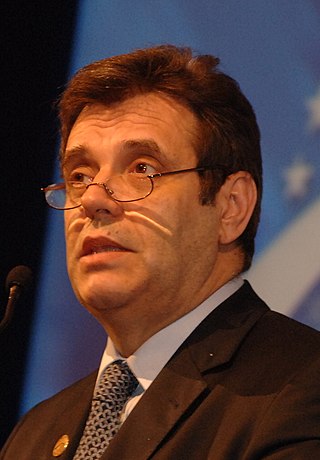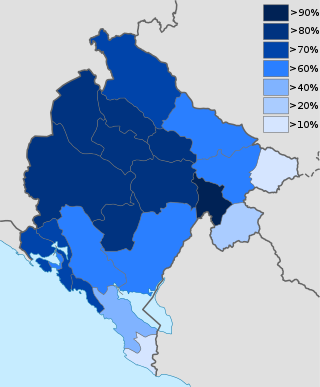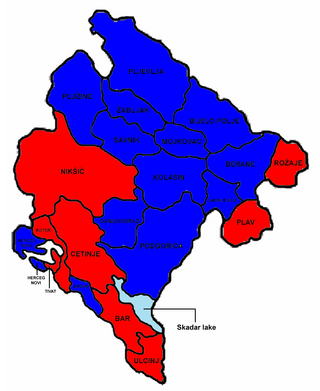| |||||
| Decades: | |||||
|---|---|---|---|---|---|
| See also: | Other events of 2000 | ||||
The following lists events that happened during 2000 in the Federal Republic of Yugoslavia .
| |||||
| Decades: | |||||
|---|---|---|---|---|---|
| See also: | Other events of 2000 | ||||
The following lists events that happened during 2000 in the Federal Republic of Yugoslavia .

The Politics of Serbia and Montenegro, known as the Federal Republic of Yugoslavia, later renamed as Serbia and Montenegro, took place in a framework of a federal parliamentary republic with a multi-party system, and after 2003, in the context of a confederation. The president was head of state and, following constitutional reforms in 2003, simultaneously head of government. Executive power was exercised by the Council of Ministers. Federal legislative power was vested in the Serbia-Montenegro Parliament.

Zoran Đinđić was a Serbian politician and philosopher who served as the prime minister of Serbia from 2001 until his assassination in 2003. He was the mayor of Belgrade in 1997. Đinđić was a long-time opposition politician and held a doctorate in philosophy.

Vojislav Koštunica is a Serbian former politician who served as the last president of FR Yugoslavia from 2000 to 2003 and as the prime minister of Serbia from 2004 to 2008.

Vuk Drašković is a Serbian writer and politician. He is the leader of the Serbian Renewal Movement, and served as the war-time Deputy Prime Minister of the Federal Republic of Yugoslavia in 1999 during the rule of Slobodan Milošević and the Minister of Foreign Affairs of both Serbia and Montenegro and Serbia from 2004 to 2007.

Momir Bulatović was a Yugoslav and Montenegrin politician. He was the first President of the Republic of Montenegro from 1990 to 1998, after which he served as the Prime Minister of the Federal Republic of Yugoslavia from 1998 until 2000, when Slobodan Milošević was overthrown. He was a leader of the Montenegro's Democratic Party of Socialists from 1989 to 1997, when he split from DPS after a conflict with Milo Đukanović.
The Serbian Liberal Party was a classical-liberal, nationalist and monarchist political party in Serbia.

The Serbian Renewal Movement is a liberal and monarchist political party in Serbia. Since its formation in 1990, it has been led by writer Vuk Drašković.
The Death of Yugoslavia is a BBC documentary series first broadcast in September and October 1995, and returning in June 1996. It is also the title of a BBC book by Allan Little and Laura Silber that accompanies the series. It covers the collapse of Yugoslavia, the subsequent wars and the signing of the final peace accords. It uses a combination of archived footage interspersed with interviews with most of the main players in the conflict, including Slobodan Milošević, Radovan Karadžić, Franjo Tuđman and Alija Izetbegović, as well as members of the international political community, who were active in the various peace initiatives.

The overthrow of Slobodan Milošević began in the Federal Republic of Yugoslavia after the general election on 24 September 2000 and culminated in the downfall of Slobodan Milošević's government on 5 October 2000. As such, it is commonly referred to as the 5 October Revolution or colloquially the Bulldozer Revolution, after one of the most memorable episodes from the day-long protest in which a heavy equipment operator charged the Radio Television of Serbia building, considered to be symbolic of the Milošević regime's propaganda.
Zoran Lilić is a Serbian and former Yugoslav politician. He served as President of the National Assembly of Serbia in 1993, and as President of the Federal Republic of Yugoslavia from 1993 to 1997.

The 1992 Montenegrin independence referendum was the first referendum regarding Montenegrin independence, held on 1 March 1992 in SR Montenegro, a constituent republic of the Socialist Federal Republic of Yugoslavia.

General elections were held in the Federal Republic of Yugoslavia on 24 September 2000. They included the presidential election, which was held using the two-round system, with a second round scheduled for 8 October. After the first round, the Federal Electoral Commission announced that Vojislav Koštunica of the Democratic Opposition of Serbia (DOS) was just short of the majority of all votes cast needed to avoid a runoff against the runner-up and incumbent president Slobodan Milošević. However, the DOS coalition claimed that Koštunica had received 52.54% of the vote. This led to open conflict between the opposition and government. The opposition organised demonstrations in Belgrade on 5 October 2000, after which Milošević resigned on 7 October and conceded the presidency to Koštunica. Subsequently released revised election results showed Koštunica with slightly over 51% of all votes cast.

The Republic of Serbia was a constituent state of the Federal Republic of Yugoslavia between 1992 and 2003 and the State Union of Serbia and Montenegro from 2003 to 2006. With Montenegro's secession from the union with Serbia in June 2006, both became sovereign states in their own right for the first time in nearly 88 years.

Presidential elections were held in Montenegro, then a constituent republic of Yugoslavia, on 5 October 1997. A second round run-off was held on 19 October 1997. Although incumbent President Momir Bulatović, who was supportive of Yugoslavian President Slobodan Milošević, received a plurality of the vote in the first round, he was defeated in the second round by Prime Minister Milo Đukanović.

Slobodan Milošević was a Yugoslav and Serbian politician who was the President of Serbia between 1989–1997 and President of the Federal Republic of Yugoslavia from 1997 until his оverthrow in 2000. Milošević played a major role in the Yugoslav Wars and became the first sitting head of state charged with war crimes.

The Democratic Movement of Serbia or DEPOS was a Serbian political coalition that existed between 1992 and 1994.
The Leaders of the Yugoslav Wars listed below comprise the important political and military figures of the Yugoslav wars.
Aleksandra Joksimović is a politician, academic, pianist, and diplomat in Serbia. She has held high political office in the Federal Republic of Yugoslavia and the Republic of Serbia, and since 30 November 2018 she has served as Serbia's ambassador to Great Britain.

On 9 November 2001, soldiers of the Special Operations Unit (JSO), an elite special forces police unit of the FR Yugoslavia State Security Service (RDB), also known as the Red Berets, raised a mutiny in response to the arrest and extradition of the Banović brothers, indicted for war crimes before the International Criminal Tribunal for the Former Yugoslavia (ICTY) and the group's opposition to the Government of Serbia headed by Prime Minister Zoran Đinđić. The mutiny ended on 17 November 2001 after certain concessions had been given to the Unit and the key figures in the State Security Service were dismissed.

Dejan Bulatović is a Serbian politician who has been a member of the National Assembly since 2022.